Analysis of the Share Economy: Airbnb and the Hospitality Sector
VerifiedAdded on 2021/04/17
|7
|1020
|33
Report
AI Summary
This report provides a critical review of the share economy, focusing on its impact on the hospitality industry. It examines the rise of peer-to-peer platforms like Airbnb, which allow individuals to rent out their properties and services. The report traces the origins of this trend, highlighting the shift in consumer preferences towards accessible and efficient alternatives to traditional methods. It further analyzes the implications of the share economy on the tourism sector, discussing its benefits for consumers, such as transparency and a wide range of options. The report also explores the future implications of the share economy, including the potential impact of regulations and the role of technological advancements. It concludes by emphasizing the rapid growth and underdevelopment of the share economy, suggesting potential for innovation and technological advancements.
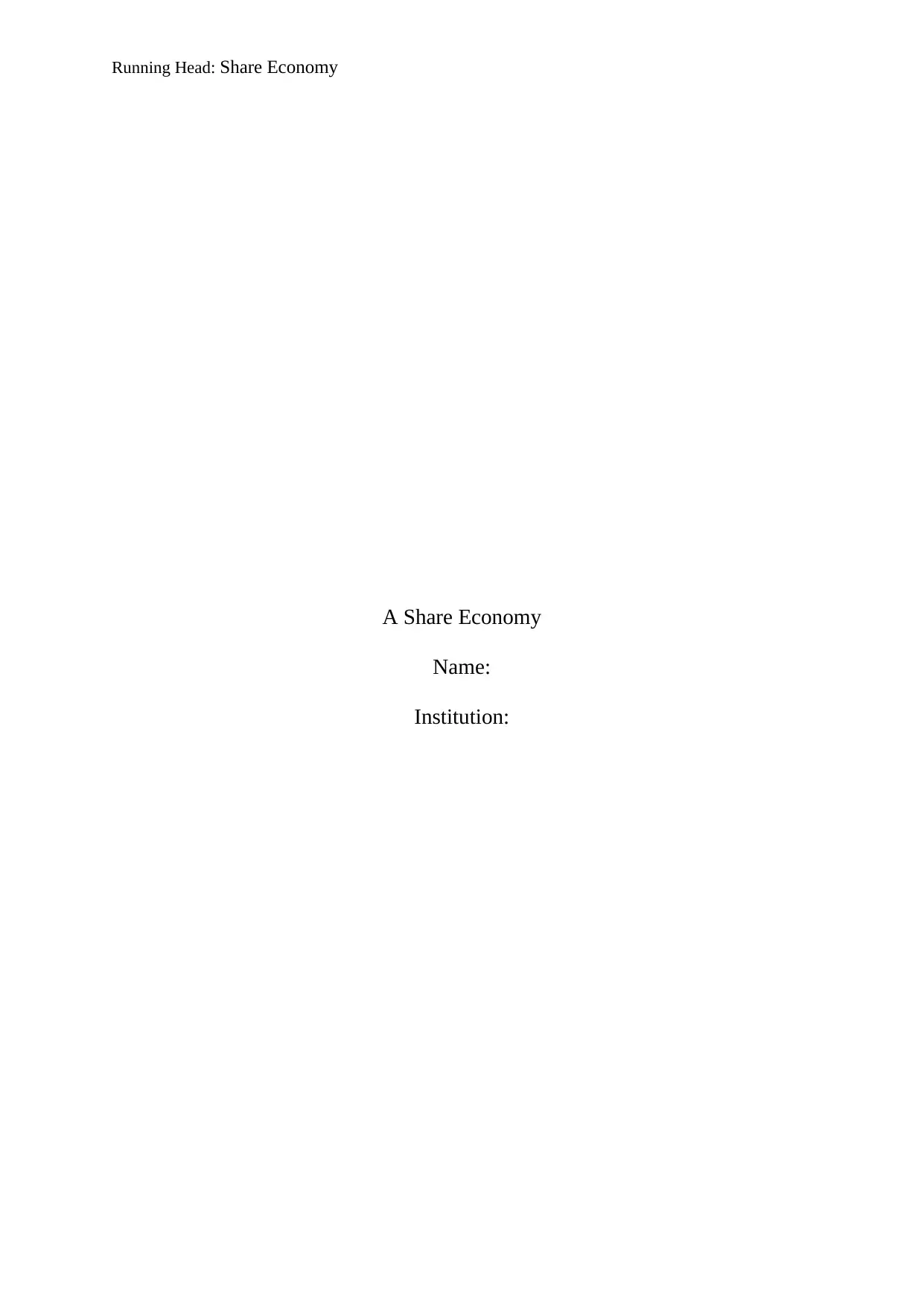
Running Head: Share Economy
A Share Economy
Name:
Institution:
A Share Economy
Name:
Institution:
Paraphrase This Document
Need a fresh take? Get an instant paraphrase of this document with our AI Paraphraser
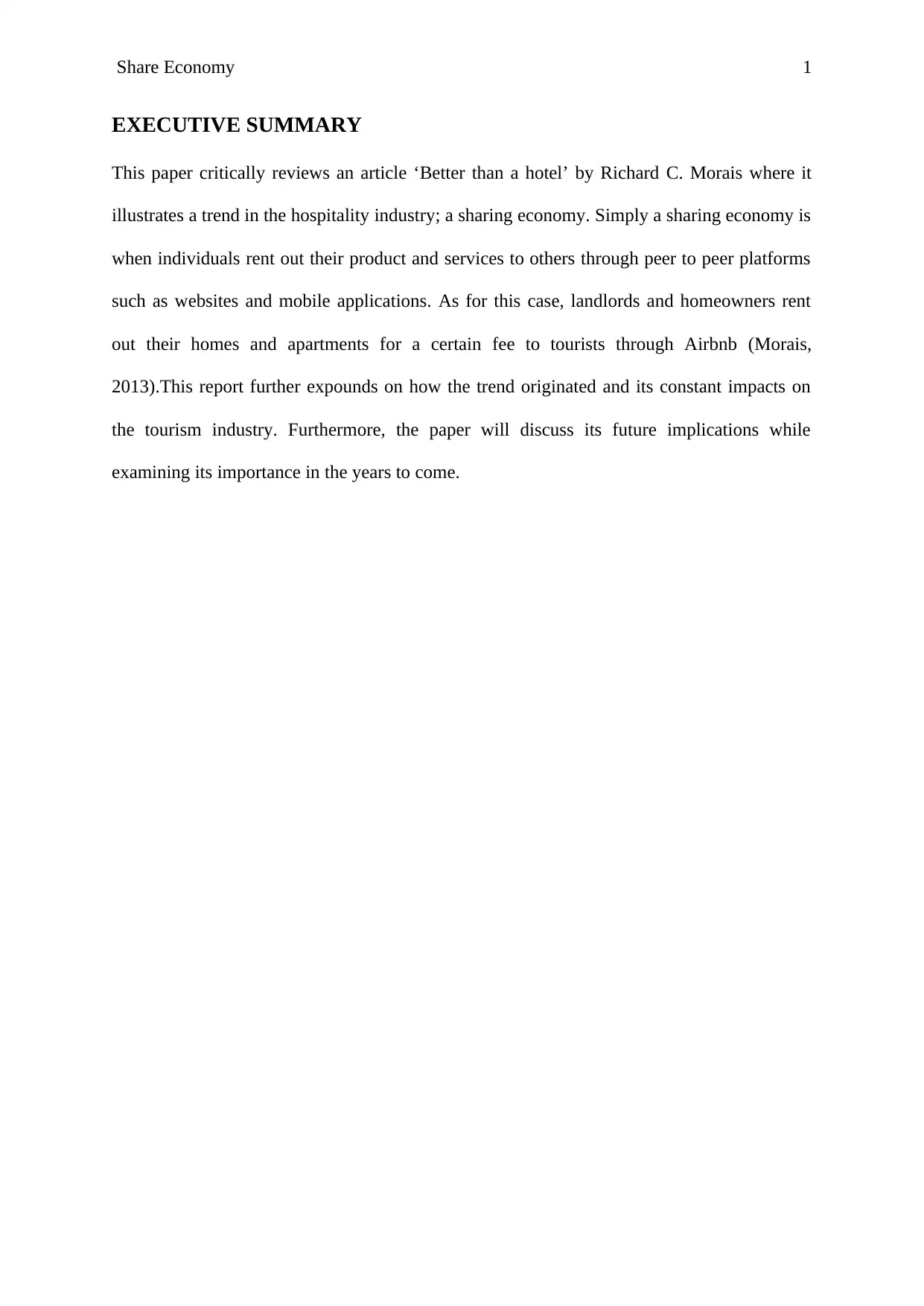
Share Economy 1
EXECUTIVE SUMMARY
This paper critically reviews an article ‘Better than a hotel’ by Richard C. Morais where it
illustrates a trend in the hospitality industry; a sharing economy. Simply a sharing economy is
when individuals rent out their product and services to others through peer to peer platforms
such as websites and mobile applications. As for this case, landlords and homeowners rent
out their homes and apartments for a certain fee to tourists through Airbnb (Morais,
2013).This report further expounds on how the trend originated and its constant impacts on
the tourism industry. Furthermore, the paper will discuss its future implications while
examining its importance in the years to come.
EXECUTIVE SUMMARY
This paper critically reviews an article ‘Better than a hotel’ by Richard C. Morais where it
illustrates a trend in the hospitality industry; a sharing economy. Simply a sharing economy is
when individuals rent out their product and services to others through peer to peer platforms
such as websites and mobile applications. As for this case, landlords and homeowners rent
out their homes and apartments for a certain fee to tourists through Airbnb (Morais,
2013).This report further expounds on how the trend originated and its constant impacts on
the tourism industry. Furthermore, the paper will discuss its future implications while
examining its importance in the years to come.
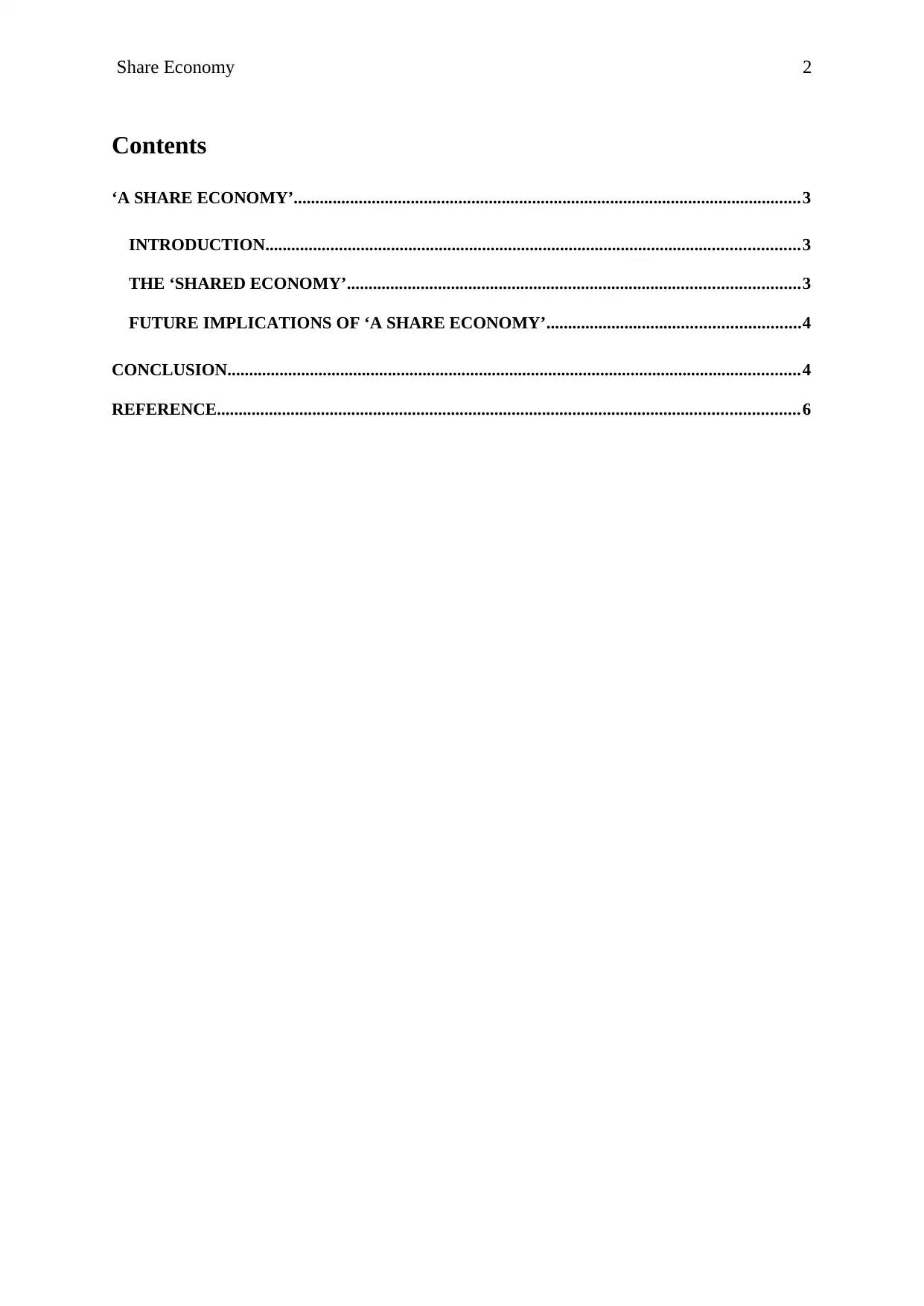
Share Economy 2
Contents
‘A SHARE ECONOMY’.....................................................................................................................3
INTRODUCTION...........................................................................................................................3
THE ‘SHARED ECONOMY’........................................................................................................3
FUTURE IMPLICATIONS OF ‘A SHARE ECONOMY’..........................................................4
CONCLUSION....................................................................................................................................4
REFERENCE......................................................................................................................................6
Contents
‘A SHARE ECONOMY’.....................................................................................................................3
INTRODUCTION...........................................................................................................................3
THE ‘SHARED ECONOMY’........................................................................................................3
FUTURE IMPLICATIONS OF ‘A SHARE ECONOMY’..........................................................4
CONCLUSION....................................................................................................................................4
REFERENCE......................................................................................................................................6
⊘ This is a preview!⊘
Do you want full access?
Subscribe today to unlock all pages.

Trusted by 1+ million students worldwide
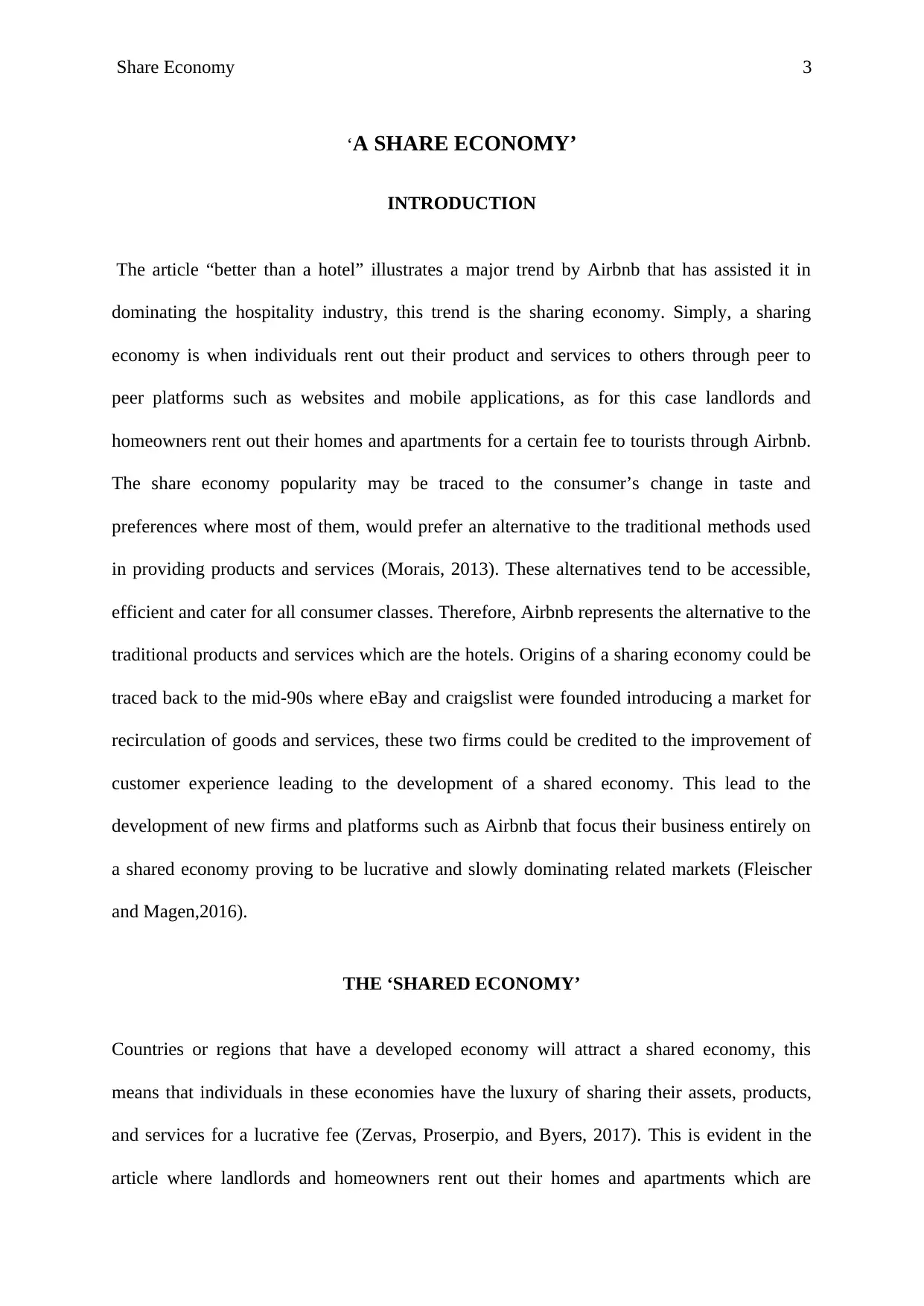
Share Economy 3
‘A SHARE ECONOMY’
INTRODUCTION
The article “better than a hotel” illustrates a major trend by Airbnb that has assisted it in
dominating the hospitality industry, this trend is the sharing economy. Simply, a sharing
economy is when individuals rent out their product and services to others through peer to
peer platforms such as websites and mobile applications, as for this case landlords and
homeowners rent out their homes and apartments for a certain fee to tourists through Airbnb.
The share economy popularity may be traced to the consumer’s change in taste and
preferences where most of them, would prefer an alternative to the traditional methods used
in providing products and services (Morais, 2013). These alternatives tend to be accessible,
efficient and cater for all consumer classes. Therefore, Airbnb represents the alternative to the
traditional products and services which are the hotels. Origins of a sharing economy could be
traced back to the mid-90s where eBay and craigslist were founded introducing a market for
recirculation of goods and services, these two firms could be credited to the improvement of
customer experience leading to the development of a shared economy. This lead to the
development of new firms and platforms such as Airbnb that focus their business entirely on
a shared economy proving to be lucrative and slowly dominating related markets (Fleischer
and Magen,2016).
THE ‘SHARED ECONOMY’
Countries or regions that have a developed economy will attract a shared economy, this
means that individuals in these economies have the luxury of sharing their assets, products,
and services for a lucrative fee (Zervas, Proserpio, and Byers, 2017). This is evident in the
article where landlords and homeowners rent out their homes and apartments which are
‘A SHARE ECONOMY’
INTRODUCTION
The article “better than a hotel” illustrates a major trend by Airbnb that has assisted it in
dominating the hospitality industry, this trend is the sharing economy. Simply, a sharing
economy is when individuals rent out their product and services to others through peer to
peer platforms such as websites and mobile applications, as for this case landlords and
homeowners rent out their homes and apartments for a certain fee to tourists through Airbnb.
The share economy popularity may be traced to the consumer’s change in taste and
preferences where most of them, would prefer an alternative to the traditional methods used
in providing products and services (Morais, 2013). These alternatives tend to be accessible,
efficient and cater for all consumer classes. Therefore, Airbnb represents the alternative to the
traditional products and services which are the hotels. Origins of a sharing economy could be
traced back to the mid-90s where eBay and craigslist were founded introducing a market for
recirculation of goods and services, these two firms could be credited to the improvement of
customer experience leading to the development of a shared economy. This lead to the
development of new firms and platforms such as Airbnb that focus their business entirely on
a shared economy proving to be lucrative and slowly dominating related markets (Fleischer
and Magen,2016).
THE ‘SHARED ECONOMY’
Countries or regions that have a developed economy will attract a shared economy, this
means that individuals in these economies have the luxury of sharing their assets, products,
and services for a lucrative fee (Zervas, Proserpio, and Byers, 2017). This is evident in the
article where landlords and homeowners rent out their homes and apartments which are
Paraphrase This Document
Need a fresh take? Get an instant paraphrase of this document with our AI Paraphraser
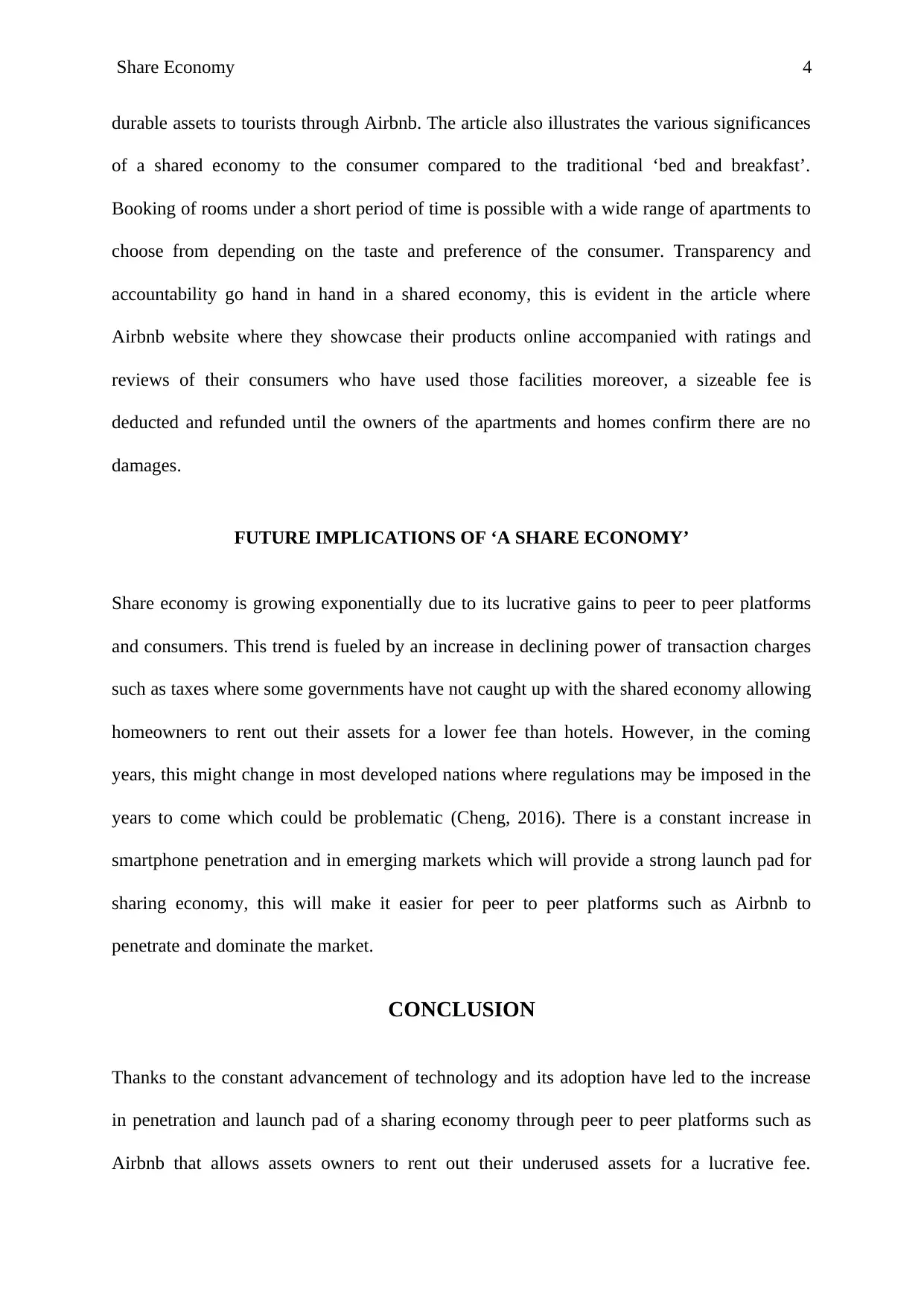
Share Economy 4
durable assets to tourists through Airbnb. The article also illustrates the various significances
of a shared economy to the consumer compared to the traditional ‘bed and breakfast’.
Booking of rooms under a short period of time is possible with a wide range of apartments to
choose from depending on the taste and preference of the consumer. Transparency and
accountability go hand in hand in a shared economy, this is evident in the article where
Airbnb website where they showcase their products online accompanied with ratings and
reviews of their consumers who have used those facilities moreover, a sizeable fee is
deducted and refunded until the owners of the apartments and homes confirm there are no
damages.
FUTURE IMPLICATIONS OF ‘A SHARE ECONOMY’
Share economy is growing exponentially due to its lucrative gains to peer to peer platforms
and consumers. This trend is fueled by an increase in declining power of transaction charges
such as taxes where some governments have not caught up with the shared economy allowing
homeowners to rent out their assets for a lower fee than hotels. However, in the coming
years, this might change in most developed nations where regulations may be imposed in the
years to come which could be problematic (Cheng, 2016). There is a constant increase in
smartphone penetration and in emerging markets which will provide a strong launch pad for
sharing economy, this will make it easier for peer to peer platforms such as Airbnb to
penetrate and dominate the market.
CONCLUSION
Thanks to the constant advancement of technology and its adoption have led to the increase
in penetration and launch pad of a sharing economy through peer to peer platforms such as
Airbnb that allows assets owners to rent out their underused assets for a lucrative fee.
durable assets to tourists through Airbnb. The article also illustrates the various significances
of a shared economy to the consumer compared to the traditional ‘bed and breakfast’.
Booking of rooms under a short period of time is possible with a wide range of apartments to
choose from depending on the taste and preference of the consumer. Transparency and
accountability go hand in hand in a shared economy, this is evident in the article where
Airbnb website where they showcase their products online accompanied with ratings and
reviews of their consumers who have used those facilities moreover, a sizeable fee is
deducted and refunded until the owners of the apartments and homes confirm there are no
damages.
FUTURE IMPLICATIONS OF ‘A SHARE ECONOMY’
Share economy is growing exponentially due to its lucrative gains to peer to peer platforms
and consumers. This trend is fueled by an increase in declining power of transaction charges
such as taxes where some governments have not caught up with the shared economy allowing
homeowners to rent out their assets for a lower fee than hotels. However, in the coming
years, this might change in most developed nations where regulations may be imposed in the
years to come which could be problematic (Cheng, 2016). There is a constant increase in
smartphone penetration and in emerging markets which will provide a strong launch pad for
sharing economy, this will make it easier for peer to peer platforms such as Airbnb to
penetrate and dominate the market.
CONCLUSION
Thanks to the constant advancement of technology and its adoption have led to the increase
in penetration and launch pad of a sharing economy through peer to peer platforms such as
Airbnb that allows assets owners to rent out their underused assets for a lucrative fee.
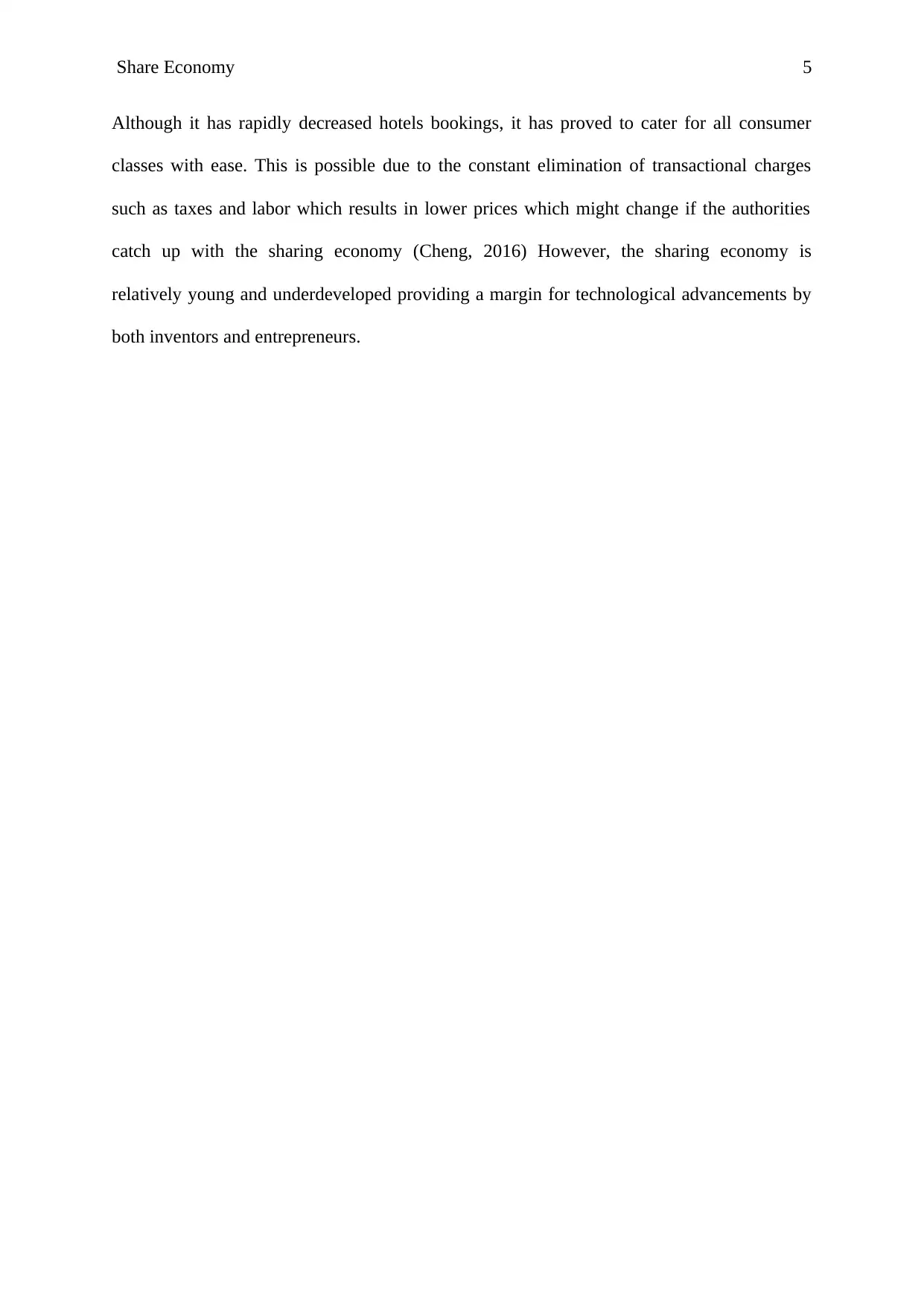
Share Economy 5
Although it has rapidly decreased hotels bookings, it has proved to cater for all consumer
classes with ease. This is possible due to the constant elimination of transactional charges
such as taxes and labor which results in lower prices which might change if the authorities
catch up with the sharing economy (Cheng, 2016) However, the sharing economy is
relatively young and underdeveloped providing a margin for technological advancements by
both inventors and entrepreneurs.
Although it has rapidly decreased hotels bookings, it has proved to cater for all consumer
classes with ease. This is possible due to the constant elimination of transactional charges
such as taxes and labor which results in lower prices which might change if the authorities
catch up with the sharing economy (Cheng, 2016) However, the sharing economy is
relatively young and underdeveloped providing a margin for technological advancements by
both inventors and entrepreneurs.
⊘ This is a preview!⊘
Do you want full access?
Subscribe today to unlock all pages.

Trusted by 1+ million students worldwide
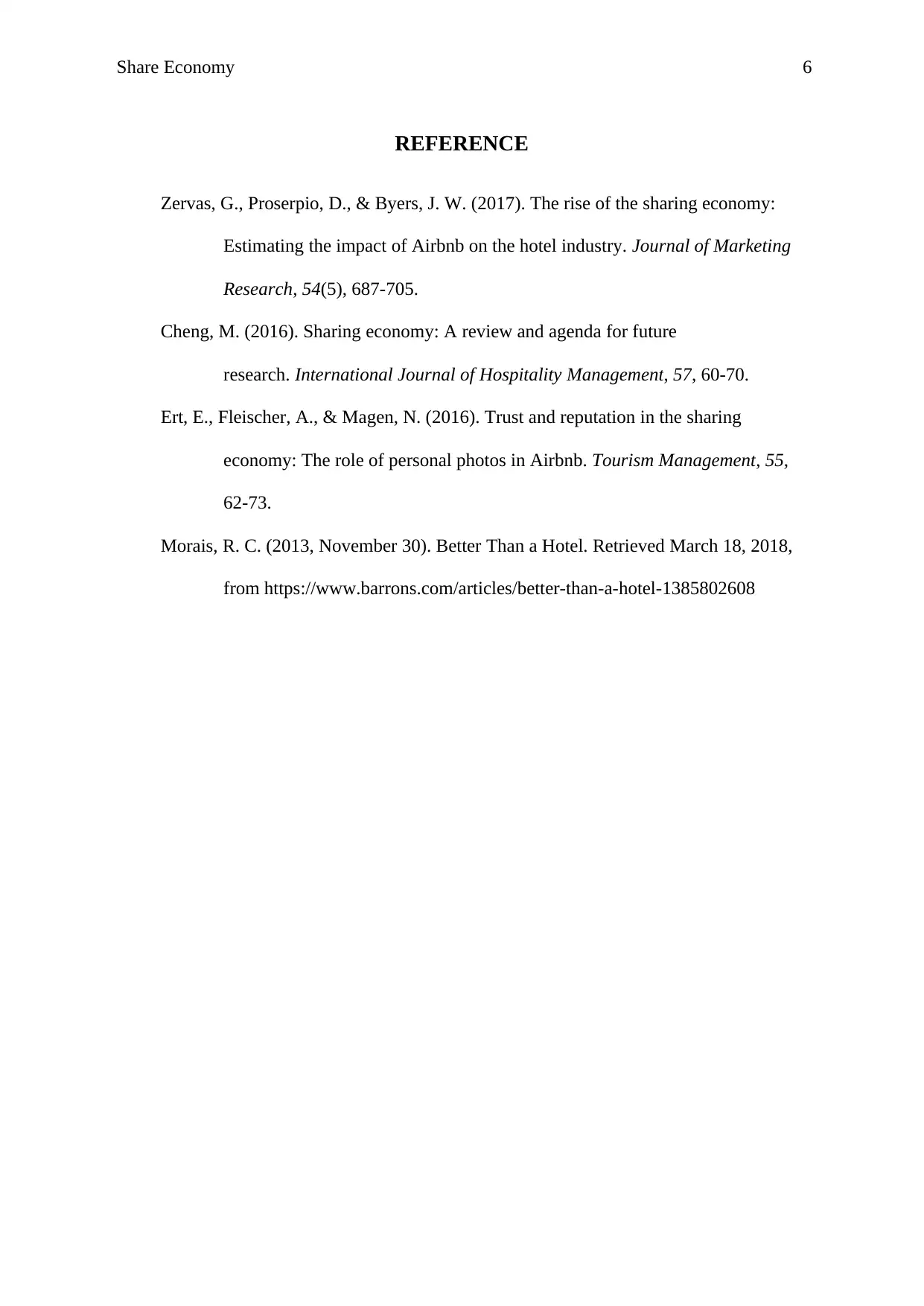
Share Economy 6
REFERENCE
Zervas, G., Proserpio, D., & Byers, J. W. (2017). The rise of the sharing economy:
Estimating the impact of Airbnb on the hotel industry. Journal of Marketing
Research, 54(5), 687-705.
Cheng, M. (2016). Sharing economy: A review and agenda for future
research. International Journal of Hospitality Management, 57, 60-70.
Ert, E., Fleischer, A., & Magen, N. (2016). Trust and reputation in the sharing
economy: The role of personal photos in Airbnb. Tourism Management, 55,
62-73.
Morais, R. C. (2013, November 30). Better Than a Hotel. Retrieved March 18, 2018,
from https://www.barrons.com/articles/better-than-a-hotel-1385802608
REFERENCE
Zervas, G., Proserpio, D., & Byers, J. W. (2017). The rise of the sharing economy:
Estimating the impact of Airbnb on the hotel industry. Journal of Marketing
Research, 54(5), 687-705.
Cheng, M. (2016). Sharing economy: A review and agenda for future
research. International Journal of Hospitality Management, 57, 60-70.
Ert, E., Fleischer, A., & Magen, N. (2016). Trust and reputation in the sharing
economy: The role of personal photos in Airbnb. Tourism Management, 55,
62-73.
Morais, R. C. (2013, November 30). Better Than a Hotel. Retrieved March 18, 2018,
from https://www.barrons.com/articles/better-than-a-hotel-1385802608
1 out of 7
Related Documents
Your All-in-One AI-Powered Toolkit for Academic Success.
+13062052269
info@desklib.com
Available 24*7 on WhatsApp / Email
![[object Object]](/_next/static/media/star-bottom.7253800d.svg)
Unlock your academic potential
Copyright © 2020–2025 A2Z Services. All Rights Reserved. Developed and managed by ZUCOL.





